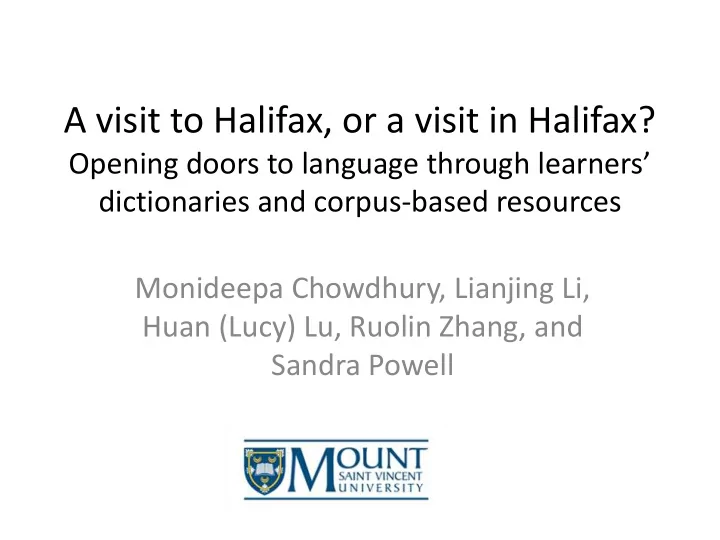

A visit to Halifax, or a visit in Halifax? Opening doors to language through learners’ dictionaries and corpus-based resources Monideepa Chowdhury, Lianjing Li, Huan (Lucy) Lu, Ruolin Zhang, and Sandra Powell
What is a learners’ dictionary? • For language learners • Definitions are not “dictionary - like”: more natural • A limited core vocabulary used for definitions and example sentences • Example sentences showing how words are used • Some information about grammar patterns • Pronunciation information: IPA and/or sound files Sandra Powell
Two online learners’ dictionaries Merriam-Webster Longman Dictionary of Contemporary English • http://learnersdictionary.com/ • https://www.ldoceonline.com/ • • Definitions use 3000-word Definitions use 2000- word vocabulary base vocabulary base • • 2-5 example sentences for 3-5 example sentences for most most meanings of most meanings of most words. words Common collocations. Corpus. • Pronunciation: IPA and • Pronunciation: IPA and sound files sound file for American for British and American pronunciation. pronunciation • Can save words looked up; • Grammar boxes and thesaurus personal vocab. list/ boxes with information keyed to dictionary language learners Sandra Powell
What is a corpus? • A (language) corpus is a collection of texts, written or (transcribed) spoken. • In 2018, corpora are electronic searchable databases containing millions of words of authentic language in use. • Part-of-speech (POS) tagging : Words in the texts are “tagged” with a POS. We can search for things like: Any preposition + “here”; Noun “visit” + any preposition • Lemma tagging: all inflected forms of a word are linked through tagging We can search for things like: Any form of “be” (is/am/are/was/were/be/been/being) + “consisted”; Any form of “insist” (insists/insisted/insist/ insisting) + “on” Sandra Powell
COCA (Corpus of Contemporary American English) • 560 million words • Texts from 1990-2017; roughly 20 million words from each year • U.S. sources • Roughly equal amounts of text from 5 genres: Spoken, radio + TV (transcribed speech) Popular magazines Newspapers Fiction Academic journals • Limited free online access • To search COCA: https://corpus.byu.edu/coca/ • Comparison of COCA with other online corpora (and links to those corpora): https://corpus.byu.edu/ Sandra Powell
Using these resources to answer questions about how words are used • When you hear or read something that sounds wrong to you, and you wonder if it’s an accepted usage • When you want good example sentences to help in teaching vocabulary • When you are curious about how the English-speaking world uses words in phrases and sentences!
“insist” Ruolin Zhang 11/17/2018
Ruolin Zhang
Ruolin Zhang
Ruolin Zhang
Ruolin Zhang
Ruolin Zhang
Questions? • How would you teach a verb like “insist”? Would you prefer to give your learners a list and ask them to memorize it? Would you prefer to give them fish compared to teach them how to fish? Ruolin Zhang
In Here ! Grammatical? Or A slang? Monideepa Chowdhury
learners' dictionary: www.ldoceonline.com Monideepa Chowdhury
Yes! It is grammatical . Monideepa Chowdhury
Monideepa Chowdhury
A question Do you have any expressions that you know are grammatical, but you can’t accept them, because you still DON’T LIKE THEM?
Disagreement on the use of “consist” ? The test is consisted of 4 parts. Lianjing Li
Two online learners’ dictionaries Lianjing Li
Usage frequency of both voices from COCA Lianjing Li
Usage frequency of both voices from COCA Lianjing Li
Usage frequency of both voices from COCA Lianjing Li
Usage frequency of both voices from COCA Lianjing Li
A question about referring to a corpus How many examples do we need as the evidence of using an expression? Lianjing Li
• I am enjoying my visit in Canada. • I am enjoying my vacation/my stay/ my time IN Canada. Huan (Lucy) Lu
Huan (Lucy) Lu
Huan (Lucy) Lu
visit to Huan (Lucy) Lu
Huan (Lucy) Lu
Huan (Lucy) Lu
Huan (Lucy) Lu
Translate and Compared • I’m enjoying my visit in • I enjoyed my visit to Canada. Canada. • In Mandarin, “ in ” as a • In Mandarin , “to” as a symbol relates to the symbol relates to the present progressive simple past tense or the tense; past perfect Tense. Huan (Lucy) Lu
Could you find any examples in the language you know where L1 grammar impacts L2 grammar learning? Huan (Lucy) Lu
Questions for discussion: When you teach patterns after verbs (like “want to do ” but “insist on doing ”), would you prefer to give your learners a list and ask them to memorize it? Would you prefer to give them fish compared to teach them how to fish? Do you have any expressions that you know are grammatical, but you can’t accept them, because you still DON’T LIKE THEM ? How many examples do we need as the evidence of using an expression? (like “the test is consisted of 4 parts”) Could you find any examples in the language you know where L1 grammar impacts L2 grammar learning? Do you have any questions for us about how we used the dictionaries and corpus to research our questions?
Recommend
More recommend